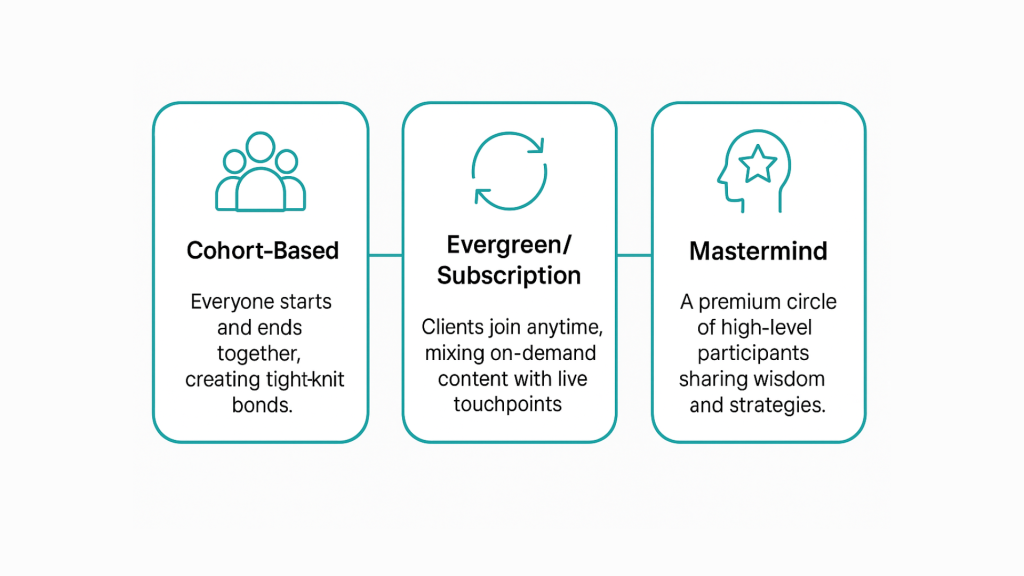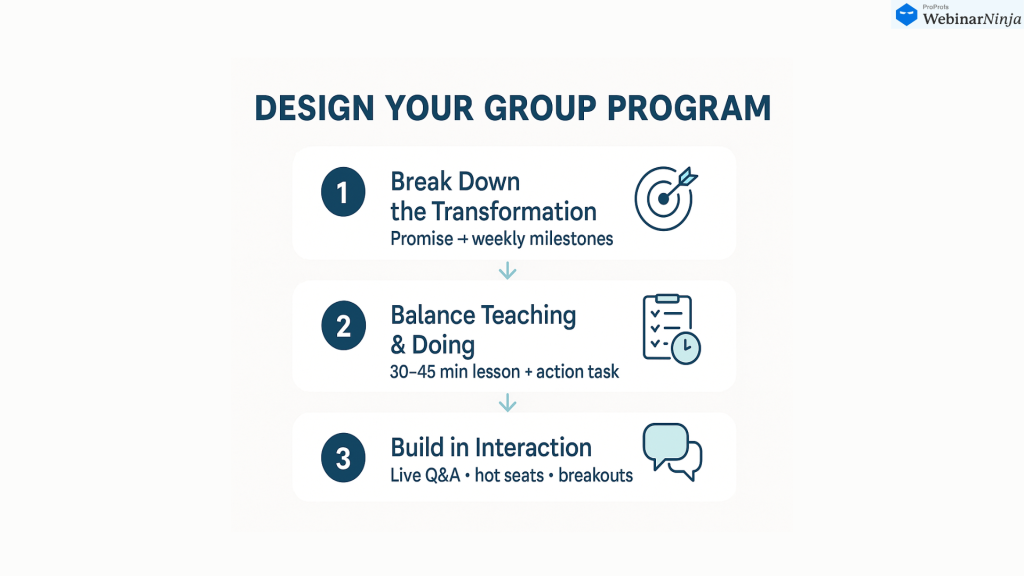Most new coaches imagine success as landing high-ticket 1:1 clients. Just you, a handful of people, and plenty of white space in your calendar.
Here’s the truth: that path is slow, capped, and often unsustainable.
Group coaching flips the script. It’s not a “discount version” of your services; it’s a scalable, profitable business model that can be even more transformative for clients.
In 2026, this might be the smartest way to grow: more impact, more income, and less burnout.
Grab your coffee. Let’s explore why the group coaching business model is so underrated and how you can make it work.
What Exactly Is the Group Coaching Business Model?
Think of group coaching as more than a “lite” version of 1:1. It’s a different play altogether.
Instead of trading time for money with a single client, you serve a group of five people, twenty people, or 200. The magic isn’t just in efficiency; it’s in the collective energy. Clients don’t just learn from you; they learn from each other. Peer support, shared accountability, and community momentum amplify the transformation.
There are three standard formats:
- Cohort-Based: Everyone starts and ends together, creating tight-knit bonds.
- Evergreen/Subscription: Clients join anytime, mixing on-demand content with live touchpoints.
Mastermind: A premium circle of high-level participants sharing wisdom and strategies.

Group coaching is built for scale, impact, and long-term sustainability.
How to Start a Group Coaching Business
Launching a group coaching program isn’t about luck but about structure. Here’s your complete playbook:
Step 1: Define Your Promise
This is the heartbeat of your program. Without a clear promise, your offer will sound vague and unconvincing.
- Write down the transformation you’ll deliver. Example: “In 8 weeks, I’ll help you design, launch, and sell your first online course.”
- Keep it specific, measurable, and time-bound. Clients want to know exactly what they’re paying for.
- Test it: Ask yourself, “If I read this as a client, would I instantly understand the outcome?”
Step 2: Choose Your Format
Your delivery model shapes the entire experience. There are three tried-and-true options:
- Cohort-Based (Fixed Start & End): Great if you’re starting out. Everyone begins together, builds bonds, and you gather feedback fast.
- Evergreen (Join Anytime): Perfect once you’ve run a few cohorts. Pair pre-recorded modules with live weekly calls for recurring revenue.
- Mastermind (High-Ticket): For advanced audiences. Small, exclusive groups with peer-to-peer insights. High intimacy, high price.
Step 3: Map Your Curriculum
Here’s where most new coaches get stuck. They have the expertise, but no roadmap. Remember: a group coaching program isn’t just “show up and teach.” It’s a guided journey where clients hit milestones each week.
Here’s how to design it:
- Break Down the Transformation: Start with your promise (e.g., “Launch your first profitable coaching offer in 8 weeks”) and divide it into bite-sized weekly milestones.
- Balance Teaching & Doing: Each week should have a short lesson (30–45 minutes), paired with an action step or assignment. Clients need progress, not just knowledge.
- Build Interaction: Add live Q&As, hot seats, or breakout groups so participants can learn from each other as well.

Here’s a sample 8-Week Group Coaching Curriculum for your ease:
Program Goal: Launch your first paid online course in 8 weeks.
- Week 1: Foundations & Mindset
→ Define your niche, clarify your target audience, and write a one-sentence value statement.
→ Example activity: Share your “elevator pitch” with the group for feedback.
- Week 2: Crafting Your Offer
→ Decide what your course will teach and the transformation it delivers.
→ Example activity: Draft your course promise and get peer review in breakout rooms.
- Week 3: Building Your Framework
→ Outline your course modules and lessons.
→ Example activity: Create a 4–6 step roadmap for your course.
- Week 4: Lead Generation Basics
→ Learn how to attract your first audience (content marketing, social media, networking).
→ Example activity: Design a simple lead magnet (PDF, checklist, or mini-training).
- Week 5: Selling With Webinars
→ Run a practice webinar to pitch your course.
→ Example activity: Write your webinar script, then deliver a 5-minute practice pitch in small groups.
- Week 6: Setting Up Systems
→ Choose platforms for course hosting, payment, and email automation.
→ Example activity: Share screenshots of your first landing page or payment link.
- Week 7: Launch Week Strategy
→ Plan your launch emails, social posts, and outreach.
→ Example activity: Draft and workshop your first sales email.
- Week 8: Graduation & Scaling
→ Review results, gather testimonials, and outline next steps.
→ Example activity: Present your launch plan to the group and celebrate wins.
👉 Homework: Write down at least four milestones your clients will hit in your program.
Step 4: Set Your Price
Stop thinking “hourly.” Group coaching is about value, not time.
- Benchmark: $2,000–$5,000 for a 6–12 week program.
- Rule of thumb: Offer 10x the value of your price. If clients can make/save $20K, a $2K program is a no-brainer.
- If you are new, start at the lower end. Once you’ve got testimonials, raise your price with each new cohort.
👉 Practice: Say your price out loud until it feels natural. Confidence sells.
Step 5: Get Your First Clients
You don’t need 50 people on day one. You need a founding cohort.
- Host a free webinar on a problem your program solves. Teach something valuable, then invite attendees to join your program.
- Use your email list or social following to announce the pilot program.
- Make it exclusive: “I’m only taking 6 people for this round.” Scarcity creates urgency.
- Offer a founding member discount in exchange for testimonials.
👉 Goal: Aim for 5–8 people in your first group. That’s enough to prove your model.
Step 6: Choose the Right Tools
Don’t drown in admin. Use tech to run smoothly. Go for an all-in-one webinar tool for client acquisition (live or automated webinar), which can be further used as a coaching platform for scheduling, payments, and progress tracking. You can also create groups for peer accountability.
In fact, here’s a video for you to learn how to create courses:
Step 7: Deliver, Learn, Repeat
Run your first round, gather feedback, and tweak. Then relaunch with sharper content and a higher price. Every round gets easier, more profitable, and more impactful.
If done right, your first group coaching program becomes the seed for a scalable business. One cohort proves the model, and from there, you can expand into evergreen programs, masterminds, or even digital courses.
The Challenges (And How to Tackle Them)
Group coaching works, but let’s be real: it’s not all smooth sailing. I’ve been in groups where one loud voice hijacked the session or where energy dipped halfway through, and it’s not pretty. The good news is these roadblocks are fixable.
Here’s your cheat sheet:
| Challenge | Fix |
|---|---|
| Group dynamics get messy | Set participation rules, use facilitation tricks (round-robins, breakout rooms). |
| Limited 1:1 time | Offer optional upgrades or host “office hours” for extra support. |
| Tech/admin headaches | Use all-in-one webinar tools to automate scheduling, payments, and client notes. |
| Engagement dips mid-program | Celebrate milestones, share wins, and spotlight participant success. |
What Should Be the Ideal Pricing for Group Coaching?
Here’s the truth: you’re not selling hours. You’re selling a transformation. Your clients don’t care if you spend 30 minutes or three hours with them. They care about the result.
When I priced my first group program, I made the rookie mistake of charging “per session.” Big fail. Clients don’t buy minutes; they buy milestones. Once I flipped that mindset, everything changed.
Here’s what you can follow:
- Benchmark Range: Most coaches land between $2,000–$5,000 for a 6–12 week program.
- Rule of Thumb: Deliver at least 10× the value of your price. If someone can make or save $20K from your program, charging $2K is a bargain.
- Start Smart: Go lower for your first cohort to build proof and testimonials. Then bump your price as you refine and scale.
Pro Tip: Say your price out loud to yourself a few times. If it feels uncomfortable, that’s a good sign. That means you’re finally charging for value, not time.
How to Find Clients for Group Coaching
Here’s the part nobody likes to admit: your program can be amazing, but if no one knows about it, it won’t matter. I learned this the hard way when I built a killer curriculum… and then launched it to crickets.
What worked? Getting visible, fast.
- Host a Free Webinar: Host free webinars, one actionable lesson and show your expertise, and invite people to join your group program. Webinars create instant trust.
- Leverage Testimonials: Even if it’s from your 1:1 clients, showcase results. Nothing sells like proof.
- Build a Community Funnel: Use social media groups, email lists, or even a Slack/Discord channel as a warm-up space.
- Start Small: You don’t need 50 clients out of the gate. Your first win might be 5–8 people, which is enough to validate and refine.
Finding clients isn’t about mass marketing; it’s about creating real conversations with the right people. Once you nail your first few, momentum builds.
Group Coaching vs. 1-on-1 Coaching
Here’s the big myth: 1:1 coaching is the “ultimate” model, and group coaching is just the budget option. In reality, they’re two very different business strategies, and the smart move is knowing when to use which.
| 1:1 Coaching | Group Coaching |
|---|---|
| Works best for advanced clients with highly specific goals. | Ideal for beginners and intermediates who share common struggles. |
| Every session is tailored like a custom suit. | Clients benefit not only from you but also from each other: peer support, networking, and accountability multiply the value. |
| Because it’s so personal, you can charge premium prices. | Scalable: whether you coach 5 people or 50, you’re delivering the same curriculum. |
| The trade-off: you’re locked into the time-for-money trap. Once your calendar’s full, growth stalls. | Pricing is lower per client but overall revenue potential is higher. |
The Hybrid Sweet Spot
When I first experimented, I ran a group program alongside a couple of high-ticket 1:1 clients. It gave me the best of both worlds; steady group revenue plus the depth (and case studies) from my individual clients. That combo built my confidence, cash flow, and credibility.
Real-Life Success Story
Theory is nice, but let’s talk results.
Michael Lancto is an online entrepreneur with a track record of multiple seven-figure deals who specializes in training network marketers. After years of coaching, he wanted to restart his training journey but needed something scalable and affordable. Platforms like Zoom were too pricey, too clunky.
Here’s what happened:
- He switched to WebinarNinja, which gave him customizable backgrounds, recording, live chat, and Q&A, all built for interactive coaching.
- He relaunched his programs with engaging webinars that connected better than standalone videos.
- Real-time feedback and audience interaction helped him refine his training while scaling at a fraction of the cost.

The Takeaway: Michael’s story shows that the right platform can make or break a group coaching business. With webinars, he created an interactive, cost-effective system that empowers network marketers to succeed while keeping his business lean and profitable.
Why Clients Love The Group Coaching Business Model
Clients don’t just join for you; they join for the room. Group coaching multiplies the value in ways 1:1 can’t.

- Community Support: Ever had a client say, “I thought I was the only one”? Groups remove that isolation. The “I’m not alone” effect is huge.
- Built-In Accountability: It’s one thing to skip homework and let your coach down and another to show up empty-handed in front of your peers.
- Networking Value: Those Zoom squares aren’t just faces but future collaborators, referral partners, and cheerleaders.
- Affordable Access: Clients get expert coaching at a fraction of 1:1 rates, which opens the door for more people to say “yes.”
I’ve seen clients transform faster in a group because they don’t just get my perspective but 10 different insights at once. That’s leverage, and it works both ways.
Ready To Launch Your Group Coaching Program?
Don’t let tech or strategy hold you back. Webinars are still the fastest way to attract, nurture, and enroll your first cohort. Whether it’s live, automated, or hybrid, they give you a platform to teach, connect, and sell at scale.
If you’re serious about growing in 2026, don’t wait until you’ve “made it” with 1:1s. Start now. Run that first small cohort, gather wins, and build from there. The sooner you launch, the sooner you’ll see the flywheel effect kick in with momentum, referrals, and recurring revenue.
Take the 30-Day Free Automated Webinar Challenge and build your first (or next) group coaching funnel from scratch. It’s free to start, and by the end, you’ll have a repeatable system that brings clients in while you sleep.
Frequently Asked Questions
What is the 7-step coaching model?
The 7-step model is a structured framework often used in coaching: 1) Build rapport, 2) Define the goal, 3) Explore the current reality, 4) Identify obstacles, 5) Generate options, 6) Create an action plan, and 7) Review progress. Group programs can adapt this model across sessions to guide the entire cohort.
What are the 3 C’s of coaching?
The 3 C’s are Clarity, Confidence, and Consistency. You help clients clarify their goals, build confidence through support and wins, and stay consistent with accountability. In group coaching, peers amplify all three.
What should I charge for group coaching?
Most 6–12 week group coaching programs are priced between $2,000–$5,000. The key is value-based pricing: charge based on the transformation you deliver, not hours. A good rule of thumb is to deliver at least 10x the value of the investment.
Want to host a webinar for free?
Use WebinarNinja to teach, improve marketing, and grow your sales.






